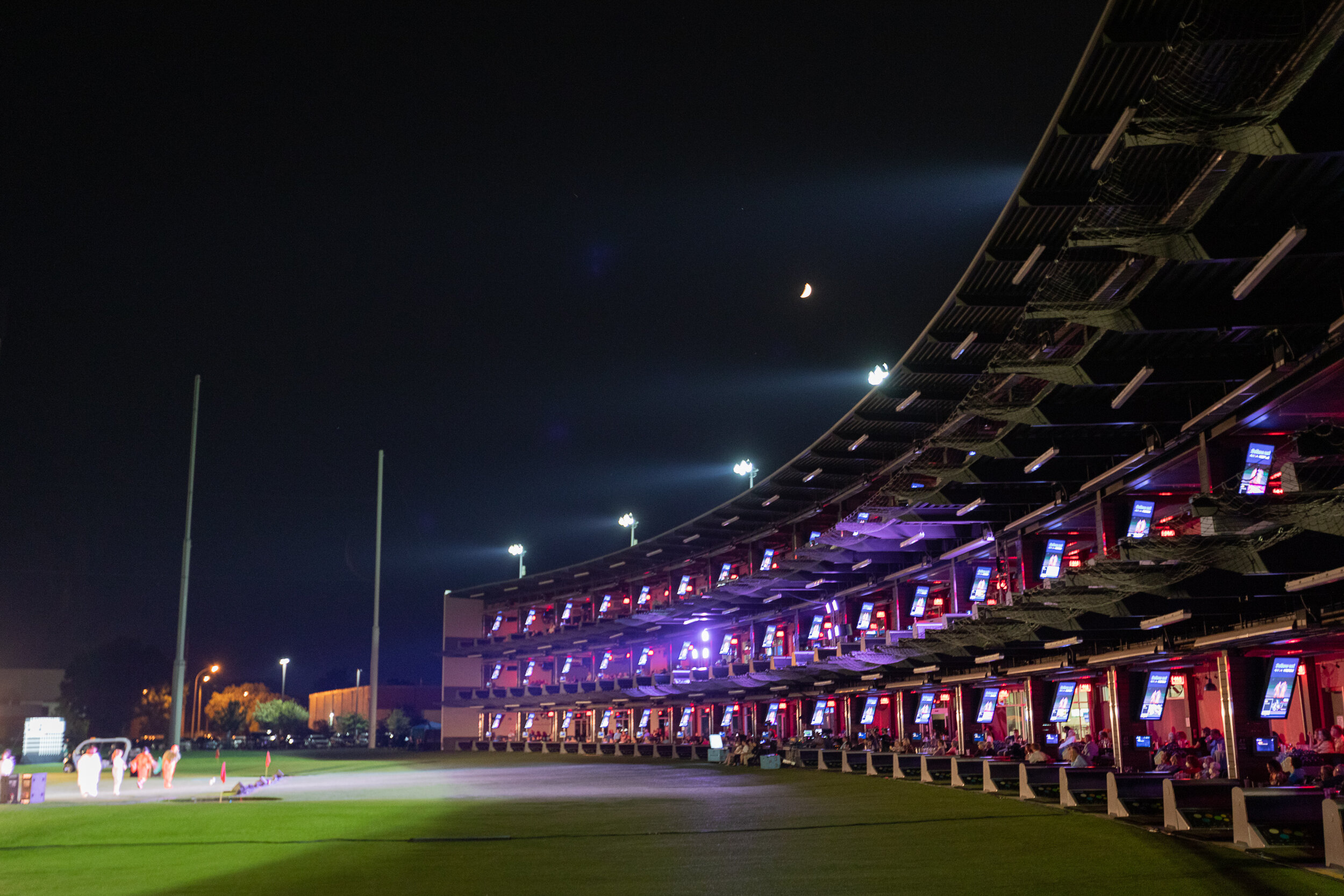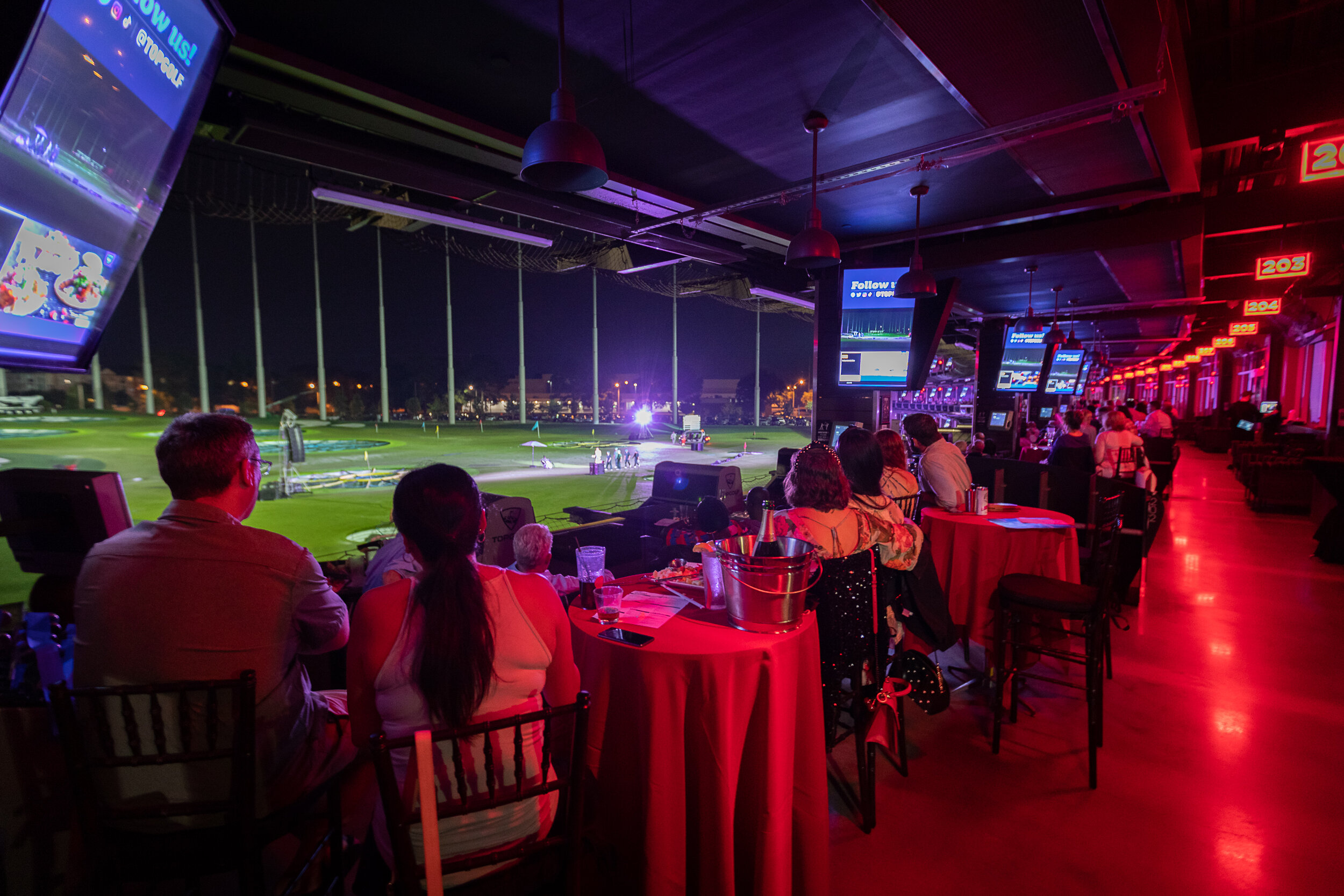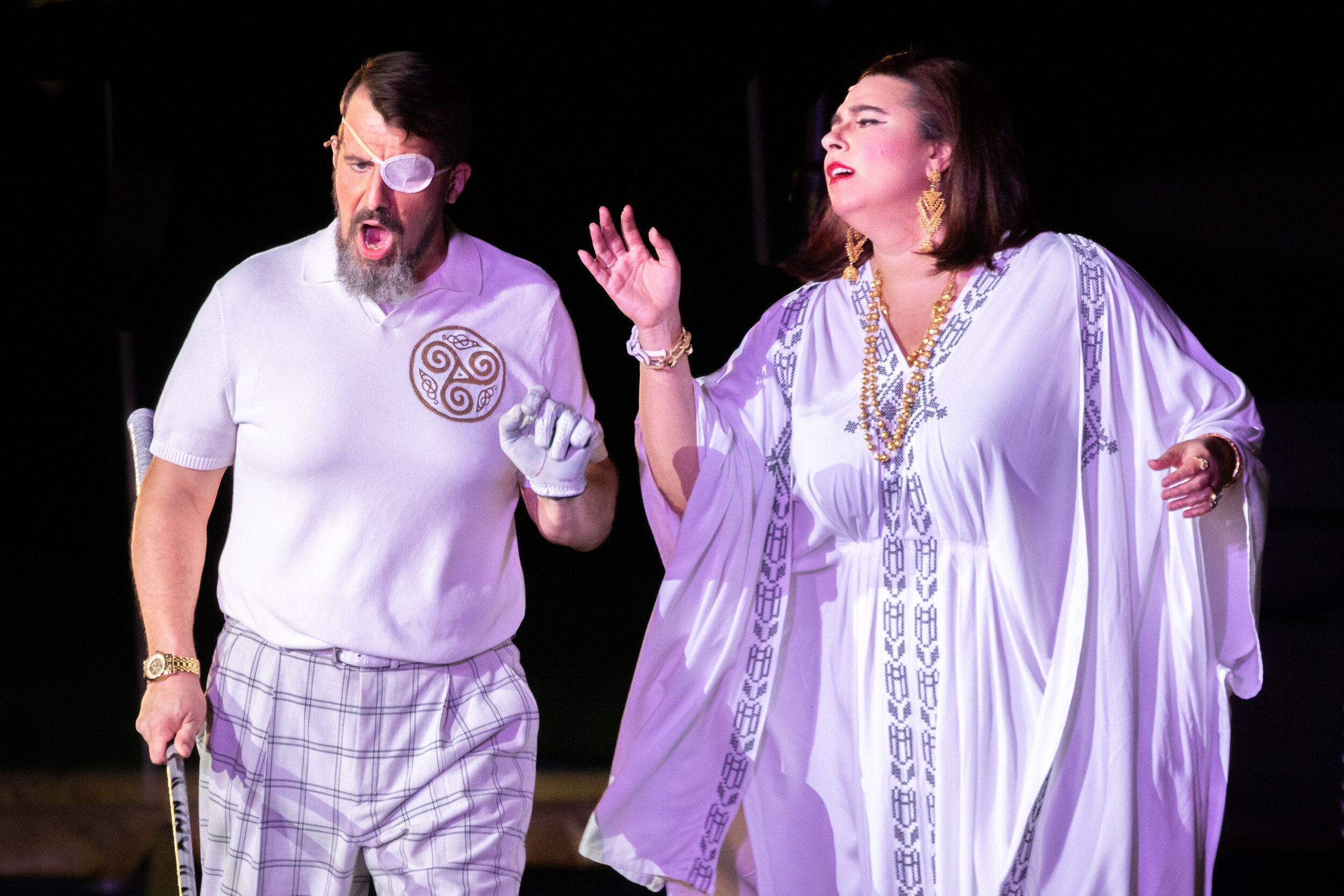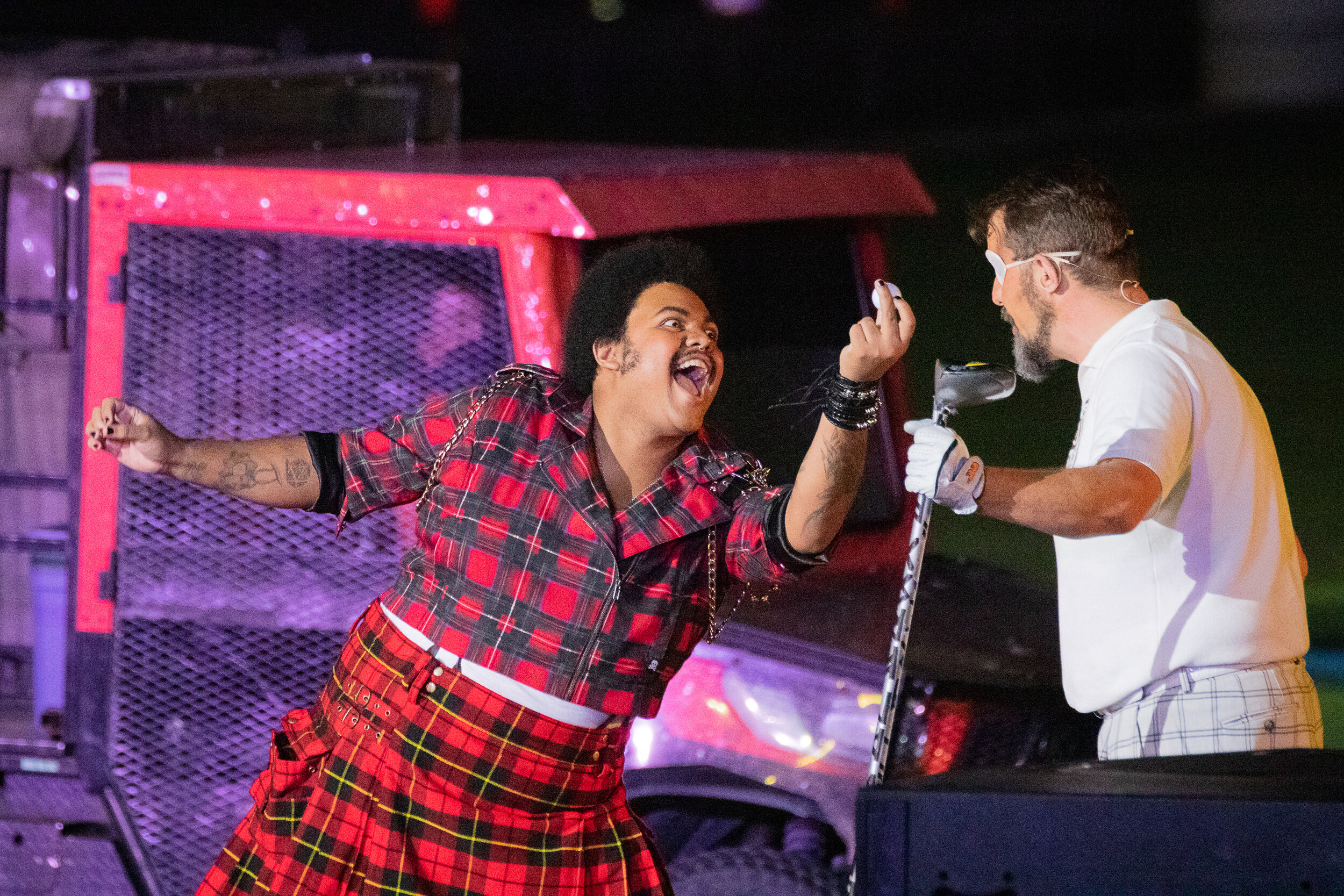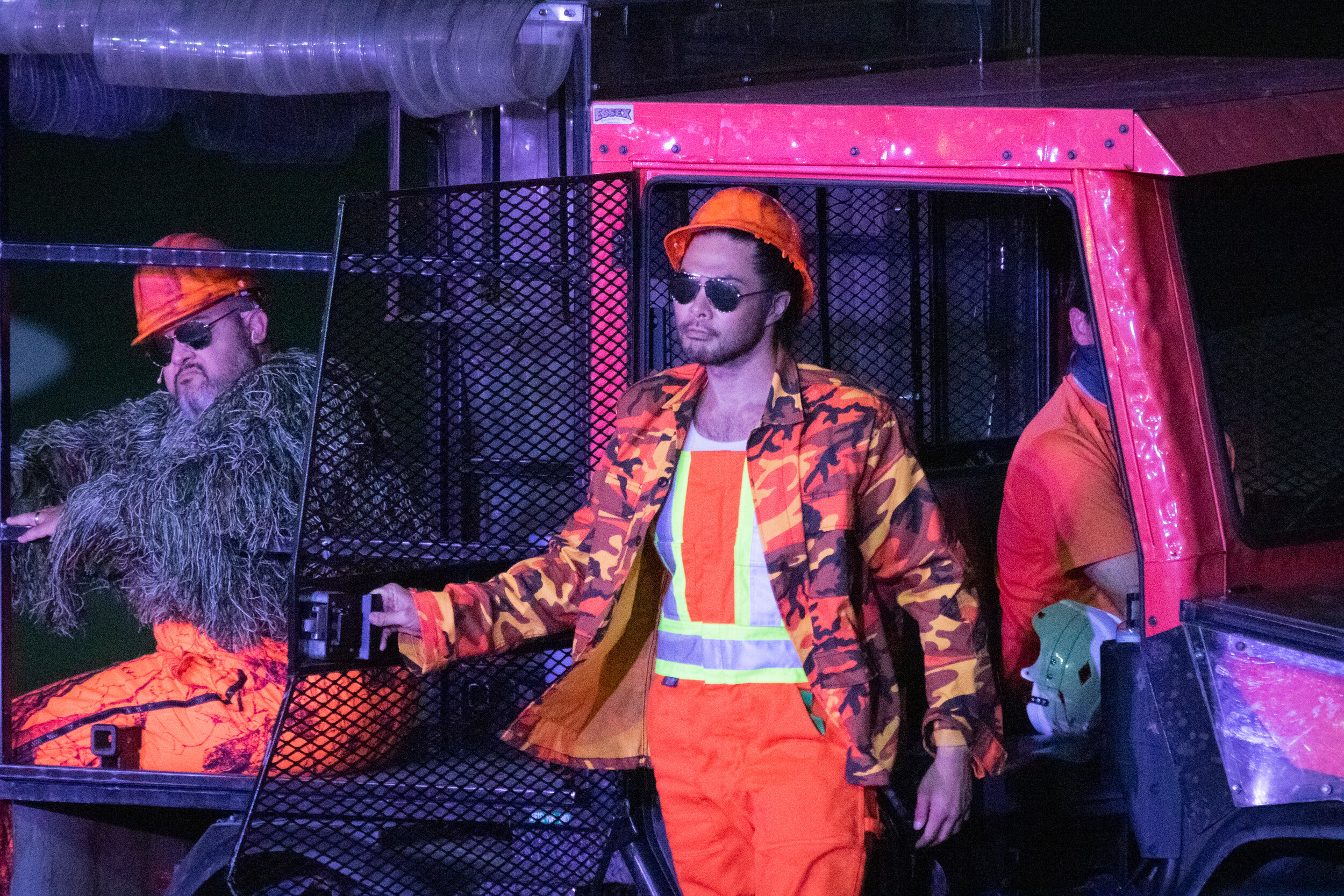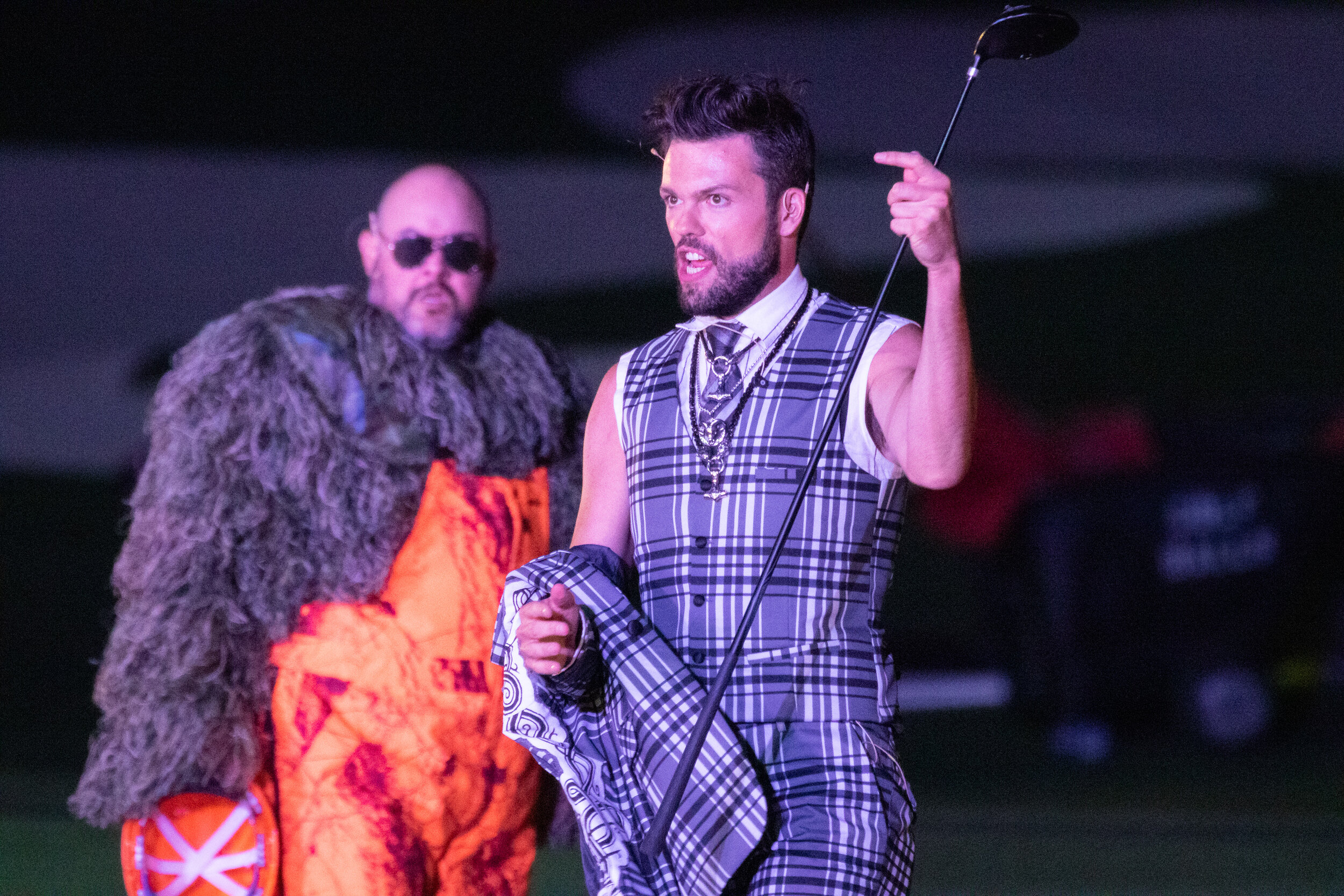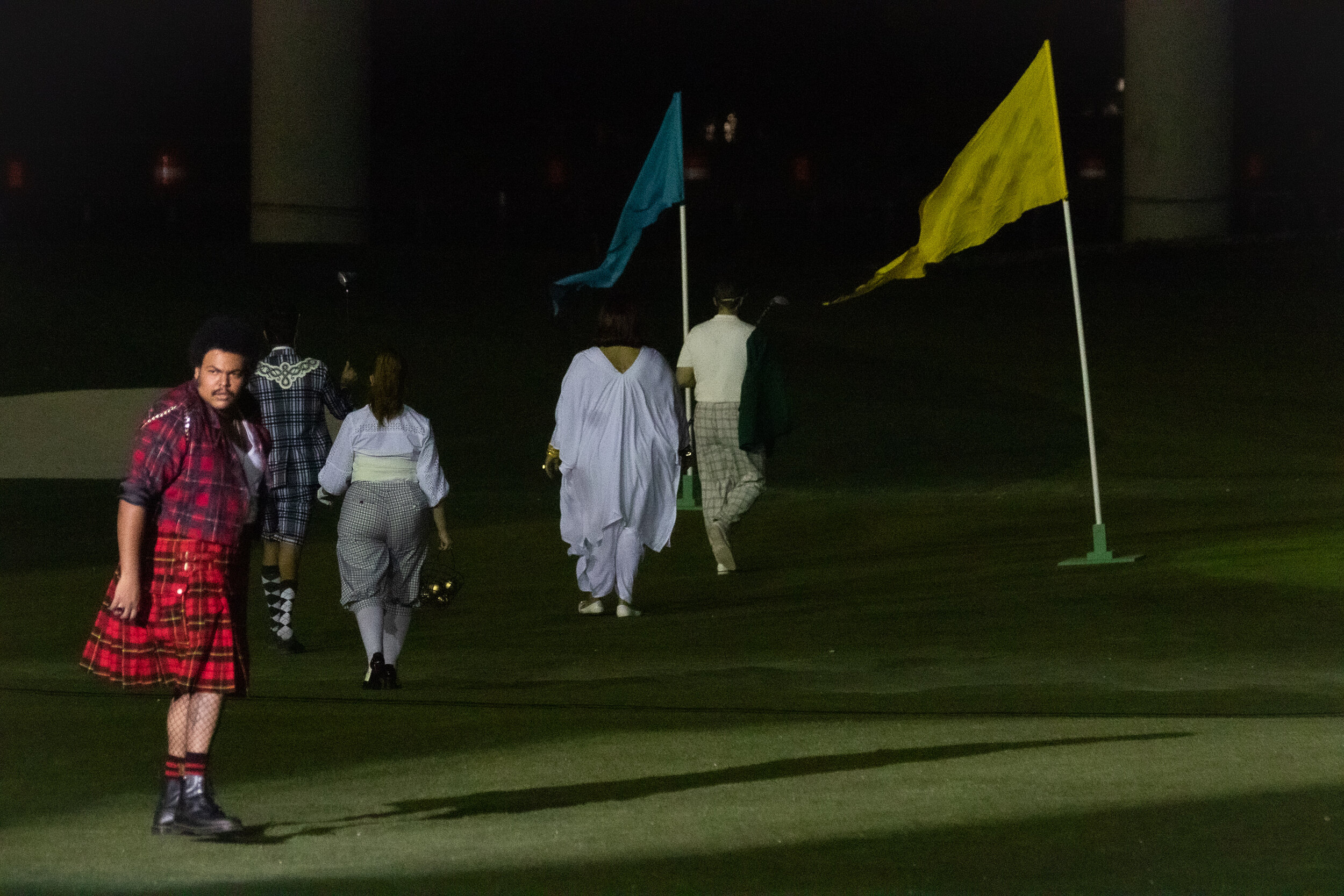Virginia Opera’s production of Das Rhinegold performed at two Topgolf locations in Virginia is a fun outing that amuses and pleases, offering live opera forced into a few bogeys by circumstances. The opera carries a timely inherent warning to mankind; however, its message delivered via a fantasy tale of gods and magic opens the door for creative, non-classical approaches for staging the opera in time periods from ancient times to modern day . VA Opera has taken their production even further, presenting it in a surprising venue, going forth where no opera company has gone before, a modern, high-tech, golf driving range.
Nibelung Alberich (Aubrey Allicock) traverses the swirling waters of the Rhine river while Rhinemaiden, Flosshilde (Whitney Robinson) looks on in the opening scene of Virginia Opera’s Das Rheingold. Photo by Ben Schill Photography; courtesy of the Virginia Opera.
Why Topgolf? Consider this: most opera companies are just now taking tentative steps toward engaging audiences again after being shut down since March 2020. What can you do as an opera company to again offer live opera while keeping performers and patrons safe and minimize the chances you may have to cancel the performance at the last minute due to the pandemic (Note: Victory Hall Opera in Charlottesville just canceled their October 8th indoor season opener due to renewed COVID concerns). Further, consider the question of how you might rescue opera from its elitist stereotypes and its stuffiness; what might you be willing to do to try to draw in a wider audience and demonstrate that opera is for everybody? Finally, how might you begin again to offer employment to opera singers and musicians and staff in these still daunting times?
Two views of the Topgolf venue during the performance: a view of the performers facing three levels of driving range bays and a view of the audience watching the performance. Photos by Ben Schill Photography; courtesy of the Virginia Opera.
These were the considerations that prompted General Director & CEO Peggy Kriha Dye and the Virginia Opera to wed opera and the middle-class commercialism that supports golf. The irony of doing this for Richard Wagner’s first opera of his Ring Cycle should not be lost; it is an opera that centers on mankind’s disregard for the environment, with commercialism being a primary culprit. Nor should we overlook the benefits of commercialism in supporting the arts, and on Sunday evening, it allowed me to sip wine and eat chips and guacamole, while listening once again to opera live, all with free parking. I have myself called for opera to occasionally let down its hair and lighten up on the reverential atmosphere of the opera house: see my post suggesting “Pizza Tuesdays”. Bravo for the effort alone!
left: Fricka (Daryl Freedman) is unhappy with the bargain that Wotan (Kyle Albertson) has made. right: Loge (Joshua Blue) and Wotan (Kyle Albertson) have been successful in robbing Alberich of the Ring. Photos by Ben Schill Photography; courtesy of the Virginia Opera.
Okay, let’s talk opera. If you are not familiar with Das Rheingold, German for the Rhine gold, it is German composer Richard Wagner’s opening to a larger work, four operas in all, referred to as the Ring Cycle (or Der Ring des Nibelungen), which covers creation thru to the end of the world, and what went wrong. Das Rheingold introduces us to rejection leading to acceptance of evil, thievery, lust for wealth and power, betrayal, murder, environmental destruction, and shunning of responsibility; and, that’s just the first installment of the Ring. The four operas are based on Norse legends; author Tolkien later used similar legends to write his “Lord of the Rings”, made into a series of popular movies. In Das Rheingold, things begin to go wrong when Nibelung dwarf Alberich is spurned in love by the Rhinemaidens who guard the river’s gold. He accepts a condition of disavowing love to be able to possess the gold and fashion a ring with the power to give him control of the world. Meanwhile, head god Wotan has promised two giants, brothers Fasolt and Fafner, his daughter Freia as payment for constructing a home for the gods. His wife Fricka is not happy with this, so Wotan and Loge, the demi-god of Fire, plan to trick Alberich out of the gold and the Ring and use those valuables to pay the brothers. They succeed, but Alberich places a curse on the Ring that trouble and death will burden the possessor of the Ring. Wotan at first wants to keep the Ring for himself, but Erda, goddess of the earth, convinces him to give it up. Then, Fafner kills Fasolt to have all the gold to himself, validating the curse. The opera concludes with the gods walking into their palatial new home, Valhalla, paid for by environmental destruction, thievery, and murder. And of course, all this plays out with Wagner’s glorius music. For more background on the opera and its production, check out this preview in the Virginian-Pilot.
left: The giant brothers, Fafner (Ricardo L. Lugo) and Fasolt (Hidenori Inoue) arrive for payment. right: Donner (Eric J. McConnell) cajoles Fafner (Ricardo L. Lugo) to accept alternative payment. Photos by Ben Schill Photography; courtesy of the Virginia Opera.
Virginia Opera has assembled an excellent cast for Das Rheingold. Few of the singers have much experience singing Wagner, but all gave a remarkably good accounting of themselves. Baritone Kyle Albertson, who plays Wotan is an experienced Wagnerian, and was excellent; if he reprises the role for a future VA Opera production of Das Rheingold, in an opera house, I will definitely attend. Soprano Catherine Goode, mezzo-soprano Lauren Cook, and mezzo-soprano Whitney Robinson played the Rhinemaidens in an opening scene that should be stunning. These sopranos were quite good individually, though the blend of their voices did not achieve the electrifying eerie pleasure when Rhinemaidens have their voices most coordinated; there also seemed to be some technical issues with the music brought in over loud speakers for this scene. Ms. Robinson played a dual role, also appearing as Erda, goddess of the earth. When she began to sing as Erda, more forceful than compassionate, my response was “Oh, yeah! Bring it!”. I think Ms. Robinson may have found a niche for herself in Wagner. Bass-baritone Aubrey Allicock as Alberich and tenor Joshua Blue as Loge were also standouts. Mezzo-soprano Daryl Freedman as Fricka, soprano Sarah Tucker as Freia, base-baritone Hidenori Inoue as Fasolt, bass Ricardo L. Lugo as Fafner, and bass-baritone Eric J. McConnell as Donner, god of thunder, all gave fine performances, especially considering this was their first foray into the Ring. Kudos to Virginia Opera for re-entering the ring with such a large and fine cast.
Fasolt (Ricardo L. Lugo) holds capture Freia (Sarah Tucker) the brother’s payment for a job well done. Photo by Ben Schill Photography; courtesy of the Virginia Opera.
The performers also deserve credit for giving their best under challenging circumstances, performing in a small area of a very large field, while facing a wide, three level super structure of driving bays, which placed them rather far from the audience - see photos above. They also had to adjust to the ambient noise of a large outdoor field placed close to a busy interstate highway. This required that they wear microphones. The lack of walls must have been somewhat disorienting with Nibelung supernumeraries appearing as a grounds crew, moving props around over a larger than usual distances. The performers also had a healthy sprint to completely exit the field area of the performance. Plus, the orchestra and conductor were sequestered away in a party room in the facility, and the accompanying music was broadcast over speakers to performers and audience alike; the singers could only see the conductor over monitors showing in their direction. One might also worry about the strain of singing two performances of a Wagner opera in one day, but keep in mind that each of the remaining operas in the Ring are over twice as long as Das Rheingold. Truly, for this performance, the singers were real troopers.
This version of Das Rheingold is a popular adaptation by Jonathan Dove and Sir Graham Vick, slightly reduced in length from the original and adapted to allow performances by ensembles smaller than the 100 or so musicians that Wagnerian operas usually require. The orchestra led by Virginia Opera Artistic Director and Conductor Adam Turner included 21 players from the Virginia Symphony who performed in an internal room to capture the sound and pipe it to the singers and the audience. This is an excellent group; however, in the beginning something did not sound quite right (mix of instruments or technical issues adjusting the sound?), and the slow, gentle beginning of the music was a bit muffled by the road noise. As a result, the opening scene with the Rhine maidens did not build slowly forth as magnificently as I expected, but after the opening scene the orchestra settled into an enjoyable flow. When everything worked together just right, the singing and accompanying music from the orchestra made for a satisfying Wagnerian music drama.
The gods walk to Valhalla, while Loge (Joshua Blue) stops to consider whether he wants to remain associated with this bunch. Photo by Ben Schill Photography; courtesy of the Virginia Opera.
The opera was played out on the the driving range field, which served as the set, placing the story in modern day. The gods appeared as golfers and were provided themed costumes, with some dillies as golf attire, fashioned by costume designer, Sarah Jean Tosetti. Wotan was attired appropriately for a modern day golfer and the brothers arrived in workmen costumes on their mini-truck. The props were combined with a bit of clever staging by Director Mary Birbaum – signs with drawings of the animals that Alberich was turned into were cleverly used for that scene. Having Wotan hit a golf ball also played to comedy, but within context. On the other hand, I felt that a scoreboard for the argument between Wotan and the giants, though amusing, veered a serious drama in the opera towards a spoof - for the record, my wife enjoyed it.
Overall, I think the audience enjoyed the entertainment as did I, and Virginia Opera accomplished most of its goals. An open question for me is whether the performances attracted and exposed a wider audience to opera. Maybe there were attendees who might have been influenced to give opera a try with the better acoustics and sets available in an opera house. It would be interesting to know. How well were the opera’s important messages were conveyed with so much going on, with the venue itself providing sensory overload, I’m not sure.
The Fan Experience: Das Rheingold was presented in both an afternoon and an evening performance on September 12 in Virginia Beach, and will be performed again on September 19 at Topgolf in Richmond, VA. Virginia Opera normally performs its operas in three locales – Norfolk, Fairfax, and Richmond. However, there was no Topgolf in the immediate area in Fairfax.
The seating at Topgolf also presented difficulties for some attendees in seeing the monitors in the bays that carried English subtitles for the opera sung in German and also close up videos of the scenes; seated close to the edge of the bay, I was not able to easily see a monitor. The close ups would have helped; with the performers moving about some distance away and our unfamiliarity with the singers’ voices early on, it was not always immediately obvious who was singing in ensembles.
My wife and I wound up watching the subtitles on our cell phones broadcast by Virginia Opera. If you choose this option, be sure to unlock your watch’s sleep timer so you don’t miss libretto parts when your phone dozes off, as we did initially. The servers for food and beverages moved about as quietly and unobtrusively as possible; there was a last call an hour into the opera.
Having the program book online from VA Opera helped, though, and reading the synopsis of the opera is to be strongly encouraged. It is difficult for newbies to know what is going on in an unfamiliar opera. In this case, given the added distractions of the venue, I’d also recommend an introduction by VA Opera just before the opera begins, giving a very brief outline of how things will transpire and pointers for watching. For example, I wonder if newbies would know what was happening when the supernumeraries started holding and waving spread out sheets to mimic the moving waters of the Rhine river, for example.
I liked being part of an opera experiment; it was interesting. I liked being in the open air, and fortunately the weather cooperated, which could have been a problem for the singers; the weather also looks good for next Sunday in Richmond. I also liked having food and beverage service at my seat, despite any distractions – and the free parking; I also liked not feeling guilty about leaning over and making a quiet comment to my wife. Would Wagner have approved? He would have shot himself. But the guy had his issues and was definitely a stuffed shirt. As stated above, I like the cast very much, and mostly, I liked being part of live opera again.


